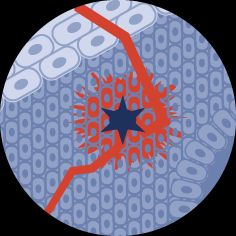People with moderate to severe eczema may receive biologics when other treatments, such as oral medications and self-care strategies, have not worked.
In the past 5 to 10 years, there has been a significant increase in treatment options for people with eczema, also known as atopic dermatitis. The approval of new oral medications and biologic therapies has greatly improved the ability to manage this chronic condition that is often refractory (meaning it does not respond well to treatment).
Whether biologic treatments should be considered depends on the severity of the person’s eczema and their personal preferences.
Biologics are typically recommended when eczema symptoms are moderate to severe or when the condition is significantly affecting a person’s quality of life. This is especially true if topical treatments have not worked or if the person constantly needs to apply topical therapies without lasting results.
Additionally, certain areas of the body can be more challenging to treat with creams or lotions. If eczema is affecting sensitive areas like the scalp, face, or genital skin, biologic treatment may be an appropriate option to consider.
The decision to start biologic therapy should be made in partnership with a doctor, considering the person’s specific situation and treatment goals.
The Food and Drug Administration (FDA) has approved four biologics to treat eczema:
- Dupilumab (Dupixent) was the first FDA-approved medication. It is a monoclonal antibody that targets interleukin-4 (IL-4) and IL-13. It is approved for children as young as 6 months of age.
- Tralokinumab (Adbry) targets IL-13 and is approved to treat moderate to severe eczema in adults and children 12 years and older.
- Lebrikizumab (Ebglyss) also targets IL-13 and is approved to treat moderate to severe eczema in adults and children 12 years and older.
- Nemolizumab (Nemluvio) targets IL-31, which seems to be particularly important in the pathogenesis, or cause, of itchiness. It is also approved to treat people 12 years and older with moderate to severe eczema.
Dupilumab, tralokinumab, and lebrikizumab are effective and have similar safety profiles. It is difficult to compare individual clinical trials. However, some studies have demonstrated similar levels of efficacy between these therapies.
Nemolizumab was approved for eczema in December 2024, so comparison data is not yet available.
Biologic treatments for eczema are relatively new in general, and lebrikizumab and nemolizumab are the newest therapies in this category.
Another class of medications called Janus kinase (JAK) inhibitors, which are small molecules that block signaling pathways that can drive inflammation, have also been shown to be effective in treating eczema.
Biologic medications are typically approved for the treatment of moderate to severe atopic dermatitis. The decision to use these treatments usually depends on factors such as the extent of the person’s eczema, the severity of their symptoms (such as itching, skin thickening, or sleep disruption), and how much the condition affects their daily life.
Additionally, if the person’s eczema has not improved with topical treatments or other therapies, biologic options may be considered.
Dr. Sara Perkins is an ABMS board certified dermatologist at Yale Medicine in Connecticut who practices general medical dermatology and has special interests in skin cancer prevention, screening, and treatment. She especially enjoys helping patients who have a diagnosis of an aggressive form of skin cancer, melanoma, and addressing other skin-related dermatologic concerns that can result from too much sun exposure. Dr. Perkins is also an instructor of dermatology at Yale School of Medicine.

